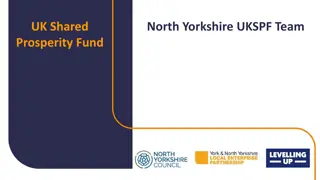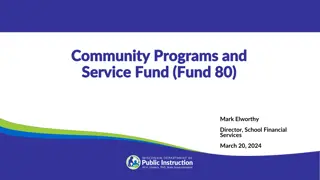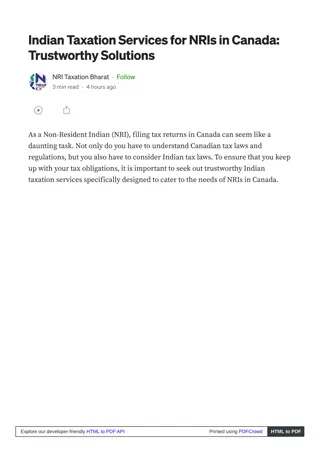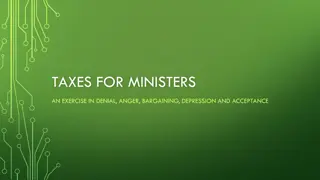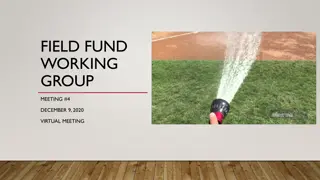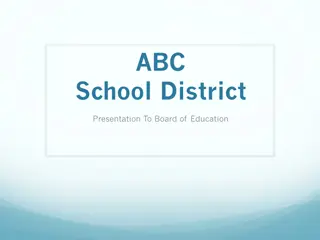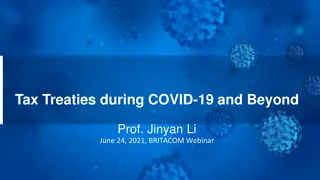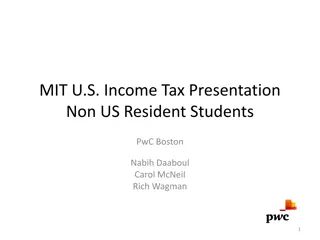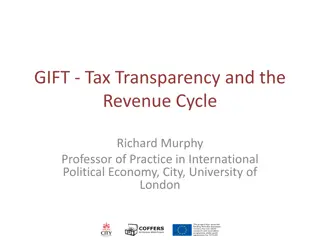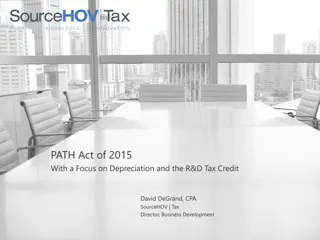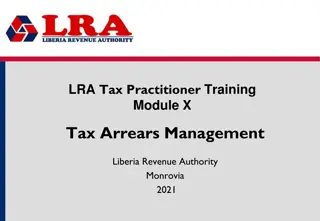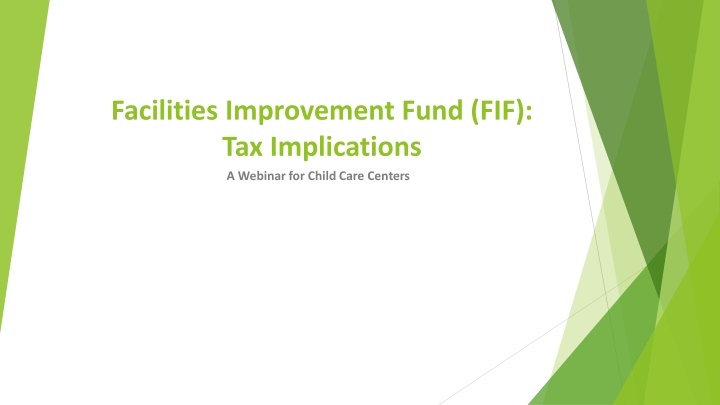
Tax Implications of Facilities Improvement Fund for Child Care Centers
Learn about the tax implications of Facilities Improvement Fund (FIF) grants for licensed child care centers, sole proprietors, partnerships, S-Corporations, and C-Corporations. This webinar delves into taxable income, depreciation, and who pays taxes based on business structure. Get insights to make informed financial decisions.
Download Presentation

Please find below an Image/Link to download the presentation.
The content on the website is provided AS IS for your information and personal use only. It may not be sold, licensed, or shared on other websites without obtaining consent from the author. If you encounter any issues during the download, it is possible that the publisher has removed the file from their server.
You are allowed to download the files provided on this website for personal or commercial use, subject to the condition that they are used lawfully. All files are the property of their respective owners.
The content on the website is provided AS IS for your information and personal use only. It may not be sold, licensed, or shared on other websites without obtaining consent from the author.
E N D
Presentation Transcript
Facilities Improvement Fund (FIF): Tax Implications A Webinar for Child Care Centers
Presenter Margie Cangelosi, E.A. MAC Tax Preparation & Payroll Services, LLC 1144 Northwood St NE Grand Rapids, MI 49505 Phone: 616.337.1757 Fax: 1.616.953.8991 margie@mactaxservice.com www.mactaxservice.com
Introduction Facilities Improvement Fund grants Licensed Child Care Centers Sole Proprietors Partnerships S-Corporations C-Corporations This webinar does not apply to in-home child care providers or not-for-profit organizations.
Introduction Informational Only This webinar has been prepared for informational purposes only. The impact of the funding will vary from provider to provider, and this webinar is not intended to provide, and should not be relied on for tax, legal, or accounting advice. You should consult your own tax, legal, and accounting advisors before engaging in any financial transaction. Questions? Questions will be answered after my slides. Webinar is being recorded, so please don t include personal financial information in questions.
Presentation Outline Taxable Income and Facilities Improvement Fund grants Example Tax Forms Depreciation
Taxable Income and Facilities Improvement Fund grants
Are Facilities Improvement Fund grants taxable income? Facilities Improvement Fund grants are part of your business s gross income. When you spend your grant money and how you make choices about depreciation will determine whether you have TAXABLE income from the grant. This presentation should help you figure that out.
Definitions Gross Income: All business income for the year Expenses: Business expenses Net Profit: Gross Income Business Expenses = Net Profit Net Profit = Taxable Income
Who pays the tax? How your business is structured will determine who pays tax on the net profit. Sole proprietor: Owner pays the tax on her personal tax return. Partnership: Partners pay the tax on their personal tax returns. S-Corporation: Owner(s) pay(s) the tax on her(their) personal tax return(s). C-Corporation: Corporation pays the tax on business tax return.
Example: Interior Repairs Without Grant Income With Grant Income of $100,000 2023 Gross Income 2023 Business Expenses $500,000 $400,000 2023 Gross Income 2023 Business Expenses $600,000 $500,000 Net Profit $500,000 - $400,000 = $100,000 Net Profit $600,000 - $500,000 = $100,000 In this example, the tax on $100,000 in grant income is $0 (0%).
Should I apply? Yes! If you use the money for repairs in the year you receive it, you will not pay tax on the grant money. Free money is the best kind of money.
Receiving Form 1099-NEC Form 1099-NEC reports non-employee compensation. If your business is structured as a sole proprietorship or partnership, you will receive Form 1099-NEC from IFF in the January or February after you receive the grant. Form 1099-NEC will be delivered to you either by mail or online. IFF will also send a copy to the IRS. This form will show your business name and your grant income whether the grant money was sent to you or directly to your contractor.
Filing Form 1099-NEC Form 1099-NEC reports non-employee compensation. As a business, if you pay $600 or more to an individual or a business owned by a sole proprietor or partners, you must file Form 1099-NEC for that contractor. You will almost certainly need to file Form 1099-NEC for your contractor. To do this: You must give IRS Form W-9 to any contractor BEFORE you pay that contractor. Form W-9 will gather the information you need about your contractor: Name Address SSN or EIN The next January, you will prepare Form 1099-NEC yourself or ask your tax preparer to prepare it for you. That form will show the amount you paid to that contractor (including any amount IFF paid on your behalf). Before January 31, you must send a copies to the contractor, the IRS, and the State of Michigan. If you do not file Form 1099-NEC for anyone to whom you pay $600 or more, you cannot deduct the expense and must pay tax on the full amount of the grant.
When to Report Income and Expenses Most child care centers are cash-basis taxpayers. Cash-basis taxpayers report: Income in the year they receive it Expenses in the year they pay for those expenses In order to minimize tax due, you will want to SPEND your grant money in the same tax year as you RECEIVE it. Some centers may be accrual-basis businesses. Accrual-basis taxpayers report: Income in the year they earn/invoice it Expenses in the year they accrue those expenses In order to minimize tax due, you will want to ACCRUE the grant expenses your in the same tax year as you ACCRUE the income.
What is depreciation? Depreciation is an accounting method that allocates the cost of an asset over it s useful life. The useful life is determined by the IRS. Example: According to the IRS, the useful life of a computer is 5 years. You buy a new laptop on January 1, 2023 for $3,000. You deduct $600 on your 2023 return $600 on your 2024 return $600 on your 2025 return $600 on your 2026 return $600 on your 2027 return
What assets are depreciable? The following may be depreciable: Any object or project that will be used for more than one year and costs $2,500 or more (furniture, equipment, bathroom remodel, etc.) Improvements (not repairs) Additions (add square footage to your business property) How is a repair different from an improvement? A repair fixes your current property to keep it at the same value. Painting Plumbing repairs Replacing less than of the doors or windows An improvement increases the value of your property. Kitchen remodel Replacing all windows Roof replacement
Choices For most depreciable assets, you can make a choice to deduct the full cost of the expense in the year of purchase instead of depreciating it. Special/bonus depreciation Section 179 deduction When you do your taxes, your tax preparer should talk to you about each depreciable item that you purchased during the year so you can choose whether to depreciate or expense that item. Most of the time you ll want to deduct the full cost in the year of purchase to reduce your tax!
The Exception If your replace more than of the windows on your building, it must be depreciated. OUCH: This improvement must be depreciated over 39 years! You receive a grant of $30,000 and pay $30,000 for all new windows in January 2023. You can only deduct $769 on your 2023 tax return. You will pay tax on $29,231 for 2023. RECOMMENDED: Use the grant for anything except replacing more than the windows in your building!

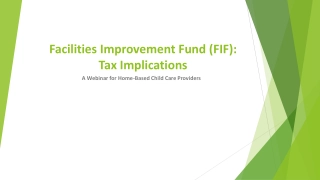

![Town of [Town Name] Real Estate Tax Rates and FY 2024 Budget Summary](/thumb/62211/town-of-town-name-real-estate-tax-rates-and-fy-2024-budget-summary.jpg)

